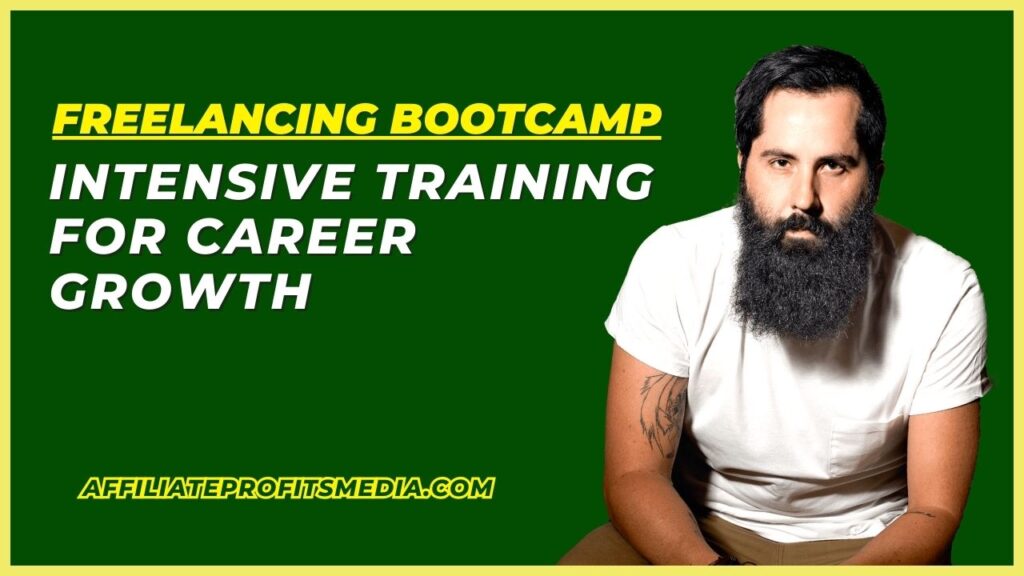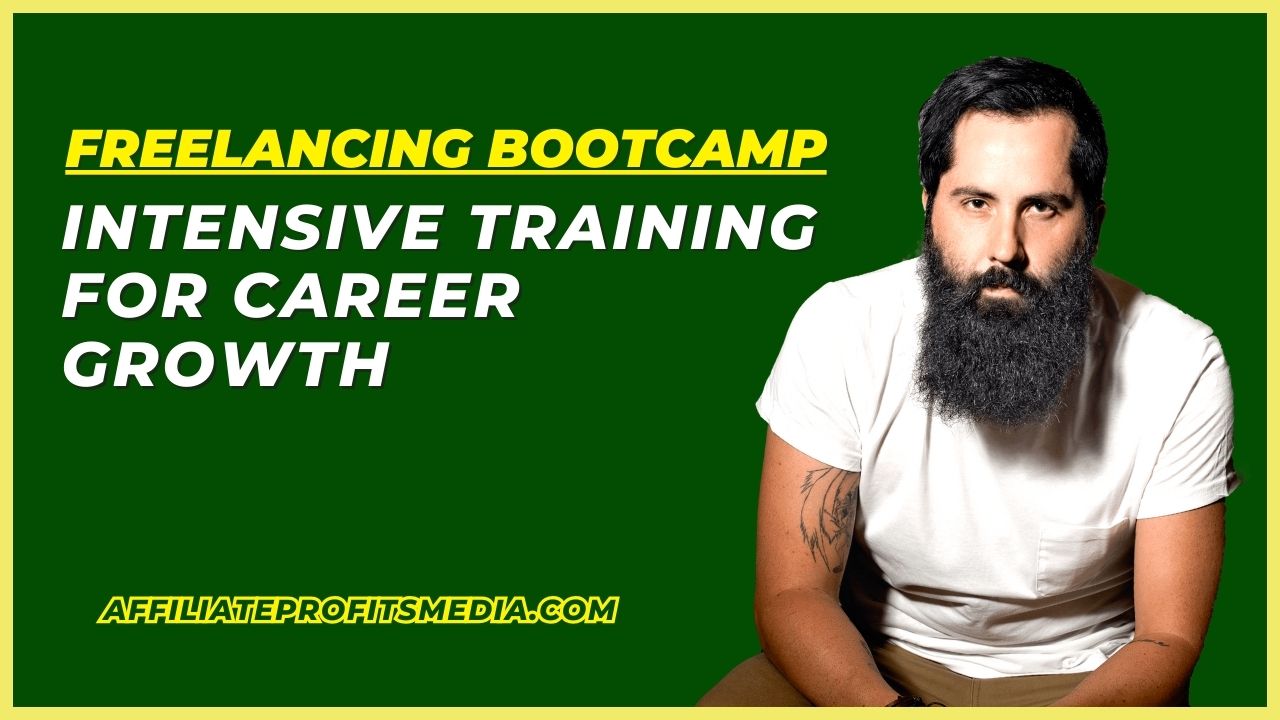In today’s dynamic job market, freelancing has become increasingly popular as a career choice. However, succeeding as a freelancer requires more than just skills in your chosen field. That’s where a Freelancing Bootcamp comes in – offering intensive training to help you not only hone your craft but also navigate the complexities of freelancing to achieve sustainable career growth. Here are eight key points to consider when diving into a Freelancing Bootcamp.
>> Here’s the Proven Way to Make $100-$200 Daily with 0 Investment – Watch This FREE Video and Start Now >>

1. Understanding the Freelance Landscape
A Freelancing Bootcamp provides insights into the current freelance landscape, including market trends, popular industries, and in-demand skills. Understanding this landscape is crucial for positioning yourself effectively and identifying lucrative opportunities.
2. Skill Enhancement and Specialization
Bootcamps offer intensive training to enhance your existing skills or develop new ones. Whether you’re a graphic designer, writer, programmer, or marketer, these programs provide specialized courses tailored to your niche, ensuring you stay competitive in your field.
3. Business and Financial Management
Freelancing isn’t just about doing the work; it’s also about managing your business efficiently. Bootcamps cover essential topics such as pricing strategies, contract negotiation, invoicing, and tax planning to help you run your freelance business smoothly.
4. Building a Strong Portfolio
A Freelancing Bootcamp helps you create a portfolio that showcases your best work effectively. You’ll learn how to curate and present your projects to attract potential clients and stand out in a crowded marketplace.
5. Marketing and Branding Yourself
Successful freelancers know the importance of marketing and personal branding. Bootcamps teach you how to market your services, leverage social media, and build a strong personal brand that resonates with your target audience.
6. Client Acquisition and Retention
Acquiring clients and retaining them is vital for long-term success as a freelancer. Bootcamps provide strategies for finding clients, pitching your services effectively, and delivering outstanding results to ensure repeat business and referrals.
7. Time Management and Productivity
Freelancers often struggle with managing their time effectively. A Bootcamp equips you with time management techniques, productivity tools, and workflows to help you juggle multiple projects efficiently without burning out.
8. Networking and Community Support
Finally, one of the most valuable aspects of a Freelancing Bootcamp is the opportunity to network with fellow freelancers and industry professionals. These connections can lead to collaborations, mentorship opportunities, and a supportive community that understands the challenges and triumphs of freelancing.
>> Here’s the Proven Way to Make $100-$200 Daily with 0 Investment – Watch This FREE Video and Start Now >>
Understanding the Freelance Landscape
The freelance landscape is dynamic and ever-evolving, presenting both challenges and opportunities for those pursuing a freelance career. Understanding the nuances of this landscape is crucial for freelancers to thrive in today’s competitive market.
- Market Trends: Stay updated on industry trends and emerging markets to identify lucrative opportunities and adapt your services accordingly.
- Demand for Skills: Recognize the most in-demand skills in your niche to focus your efforts on areas where you can excel and meet client needs.
- Remote Work Boom: Embrace the rise of remote work, which has expanded the pool of potential clients globally and opened up new avenues for freelancers.
- Gig Economy Platforms: Explore various gig economy platforms that connect freelancers with clients, offering opportunities for steady work and income.
- Competition and Differentiation: Stand out from the competition by showcasing your unique strengths, skills, and expertise through effective branding and marketing.
- Industry Regulations: Familiarize yourself with relevant regulations and compliance requirements, especially in regulated industries like finance or healthcare.
- Emergence of Niche Markets: Identify niche markets where your skills are in high demand and competition is less fierce, allowing you to command higher rates.
- Future Trends and Adaptation: Anticipate future trends in the freelance landscape and be prepared to adapt your skills and services to meet evolving client needs.
By understanding the freelance landscape and staying attuned to market trends, freelancers can position themselves for success in a rapidly changing environment, maximizing their opportunities for growth and profitability.
Skill Enhancement and Specialization
In the competitive world of freelancing, continuous skill enhancement and specialization are essential for staying ahead. Here are key points to help you elevate your freelance career through focused skill development.
- Assess Your Current Skills: Evaluate your existing skill set to identify areas for improvement and specialization.
- Targeted Training Programs: Enroll in specialized training programs or bootcamps tailored to your niche to enhance your skills and stay updated with industry trends.
- Mastering Tools and Technologies: Stay abreast of relevant tools and technologies in your field to increase efficiency and productivity.
- Portfolio Development: Showcase your newly acquired skills through a diverse and impressive portfolio that highlights your expertise.
- Continuous Learning: Commit to lifelong learning by seeking out new challenges and opportunities to expand your skill set.
- Networking and Collaboration: Collaborate with other freelancers or industry professionals to exchange knowledge and skills, fostering growth and innovation.
- Client Education: Educate your clients about your specialized skills and how they can benefit from them, positioning yourself as an expert in your niche.
By continuously enhancing your skills and specializing in a particular niche, you can differentiate yourself in the freelance market, attract high-paying clients, and build a successful and sustainable freelance career.
Business and Financial Management
Effective business and financial management are vital for freelancers to thrive in their careers. Here are eight key points to help freelancers manage their finances and businesses efficiently.
- Budgeting: Create a budget to track income and expenses, ensuring financial stability and proper resource allocation.
- Pricing Strategies: Develop pricing strategies that reflect your skills, market demand, and value proposition to ensure profitability.
- Contract Negotiation: Master the art of negotiation to secure fair contracts and terms that protect your interests.
- Invoicing and Payment Systems: Implement streamlined invoicing and payment systems to ensure timely payments and cash flow management.
- Tax Planning: Stay compliant with tax regulations by understanding deductions, setting aside funds for taxes, and seeking professional advice when necessary.
- Insurance and Liability: Protect yourself and your business with appropriate insurance coverage to mitigate risks and liabilities.
- Financial Tools: Utilize accounting software and financial tools to automate processes and gain insights into your business finances.
- Emergency Funds and Savings: Build emergency funds and savings to weather lean periods and invest in future growth opportunities.
By mastering business and financial management skills, freelancers can ensure financial stability, minimize risks, and lay the groundwork for long-term success in their freelance careers.
Building a Strong Portfolio
A compelling portfolio is essential for freelancers to showcase their skills and attract clients. Here are seven key points to help freelancers create a strong portfolio:
- Select Your Best Work: Curate your portfolio with your most impressive and relevant projects that demonstrate your expertise.
- Showcase Variety: Include a diverse range of projects to showcase your versatility and breadth of skills.
- Highlight Results: Clearly outline the results and impact of each project to demonstrate your value to potential clients.
- Professional Presentation: Present your portfolio in a professional and visually appealing manner that reflects your brand.
- Update Regularly: Keep your portfolio updated with your latest work to stay relevant and showcase ongoing growth.
- Include Testimonials: Incorporate client testimonials or endorsements to add credibility and build trust.
- Tailor for Your Audience: Customize your portfolio to cater to the specific needs and preferences of your target clients.
A strong portfolio is a freelancer’s most powerful marketing tool, showcasing their skills, experience, and professionalism to potential clients. By following these key points, freelancers can create a portfolio that effectively highlights their strengths and attracts opportunities for growth and success.
>> Here’s the Proven Way to Make $100-$200 Daily with 0 Investment – Watch This FREE Video and Start Now >>
Marketing and Branding Yourself
In the competitive world of freelancing, effective marketing and personal branding are essential for standing out and attracting clients. Here are eight key points to help freelancers market and brand themselves successfully:
- Define Your Unique Value Proposition: Identify what sets you apart from others in your field and communicate it clearly to potential clients.
- Create a Professional Online Presence: Develop a professional website and optimize your social media profiles to showcase your skills and expertise.
- Content Marketing: Share valuable content related to your niche through blog posts, articles, or videos to demonstrate your knowledge and attract an audience.
- Networking: Build relationships with other freelancers, industry professionals, and potential clients through networking events, online communities, and social media.
- Offer Freebies or Samples: Provide free samples of your work or offer initial consultations to showcase your skills and build trust with potential clients.
- Collect and Showcase Testimonials: Request feedback from satisfied clients and display their testimonials prominently on your website and marketing materials.
- Consistent Branding: Ensure consistency in your branding across all platforms, including your logo, colors, and messaging, to create a cohesive and memorable brand identity.
- Continuous Promotion: Regularly promote your services through email newsletters, social media posts, and targeted advertising to stay top-of-mind with potential clients.
By implementing these strategies for marketing and personal branding, freelancers can effectively differentiate themselves in the market, attract their ideal clients, and build a strong and sustainable freelance business.
Client Acquisition and Retention
Client acquisition and retention are crucial for freelancers to maintain a steady workflow and sustainable income. Here are seven key strategies to help freelancers acquire and retain clients effectively:
- Targeted Outreach: Identify your ideal clients and proactively reach out to them through personalized pitches or networking events.
- Showcase Your Expertise: Demonstrate your expertise through case studies, portfolio samples, or blog posts to attract potential clients who need your specific skills.
- Provide Exceptional Service: Deliver high-quality work on time and exceed client expectations to build trust and foster long-term relationships.
- Communication is Key: Maintain clear and open communication with clients throughout the project, addressing any concerns promptly and professionally.
- Offer Value-Added Services: Provide additional value to clients by offering complimentary services, resources, or insights that enhance their experience.
- Ask for Referrals: Request referrals from satisfied clients and incentivize them to recommend your services to others in their network.
- Follow-Up and Stay Connected: Regularly follow up with past clients to inquire about their needs and remind them of your services for future projects.
By implementing these client acquisition and retention strategies, freelancers can build a solid client base, secure repeat business, and foster positive relationships that contribute to their long-term success in the freelance industry.
Time Management and Productivity
Effective time management and productivity are essential for freelancers to maximize their output and maintain a healthy work-life balance. Here are seven key strategies to help freelancers manage their time and boost productivity:
- Set Clear Goals: Define specific, achievable goals for each day or week to stay focused and motivated.
- Prioritize Tasks: Identify the most important tasks and tackle them first to ensure progress on key projects.
- Utilize Time Blocking: Schedule dedicated blocks of time for different tasks or projects to minimize distractions and maintain focus.
- Take Breaks: Incorporate regular breaks to prevent burnout and maintain mental clarity throughout the day.
- Limit Distractions: Minimize interruptions by setting boundaries, turning off notifications, and creating a conducive work environment.
- Delegate or Outsource: Delegate tasks that are not your core competency or outsource them to free up time for high-value work.
- Reflect and Adjust: Regularly review your productivity strategies, identify areas for improvement, and make necessary adjustments to optimize your workflow.
By implementing these time management and productivity strategies, freelancers can maximize their efficiency, meet deadlines consistently, and achieve a better work-life balance, leading to greater overall success in their freelance careers.
Networking and Community Support
Networking and community support are invaluable resources for freelancers, providing opportunities for collaboration, learning, and growth. Here are eight key points to help freelancers build strong networks and find support within their communities:
- Join Online Platforms: Participate in freelancer communities on platforms like LinkedIn, Reddit, or specialized forums to connect with like-minded professionals.
- Attend Events and Workshops: Attend industry events, workshops, and conferences to network with peers and stay updated on industry trends.
- Utilize Social Media: Engage with fellow freelancers and potential clients on social media platforms to expand your network and visibility.
- Join Professional Associations: Become a member of relevant professional associations or groups to access resources, mentorship, and networking opportunities.
- Offer Help and Advice: Share your knowledge and expertise with others in your community to build goodwill and establish yourself as a valuable resource.
- Seek Mentors: Find experienced freelancers or mentors who can provide guidance, support, and valuable insights into your industry.
- Collaborate with Peers: Collaborate on projects with other freelancers to leverage each other’s strengths and expand your skill set.
- Attend Local Meetups: Join local freelancer meetups or coworking spaces to meet others in your area and foster face-to-face connections.
By actively participating in networking activities and seeking out community support, freelancers can expand their professional circles, gain valuable insights, and establish a strong foundation for success in their freelance careers.
Conclusion
Investing in a Freelancing Bootcamp is not just about acquiring skills; it’s about investing in your future as a successful freelancer. By gaining a deeper understanding of the freelance landscape, enhancing your skills, mastering business fundamentals, and building a strong network, you’ll be well-positioned to achieve sustainable career growth in the world of freelancing.
>> Here’s the Proven Way to Make $100-$200 Daily with 0 Investment – Watch This FREE Video and Start Now >>
Thank you for taking the time to read my article “Freelancing Bootcamp: Intensive Training for Career Growth”, hope it helps!













